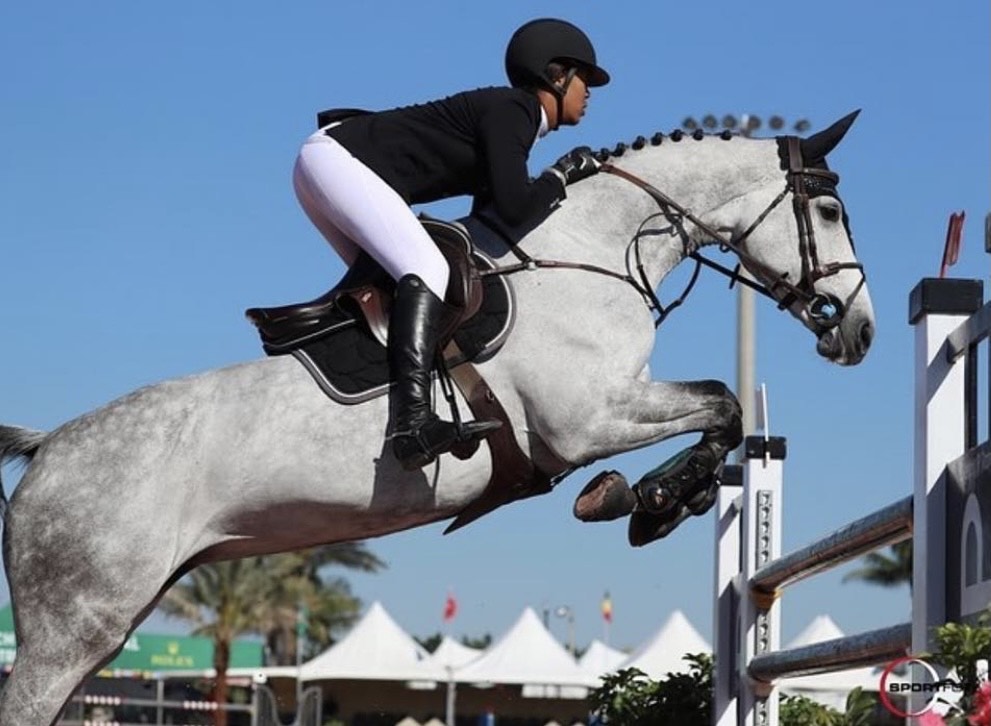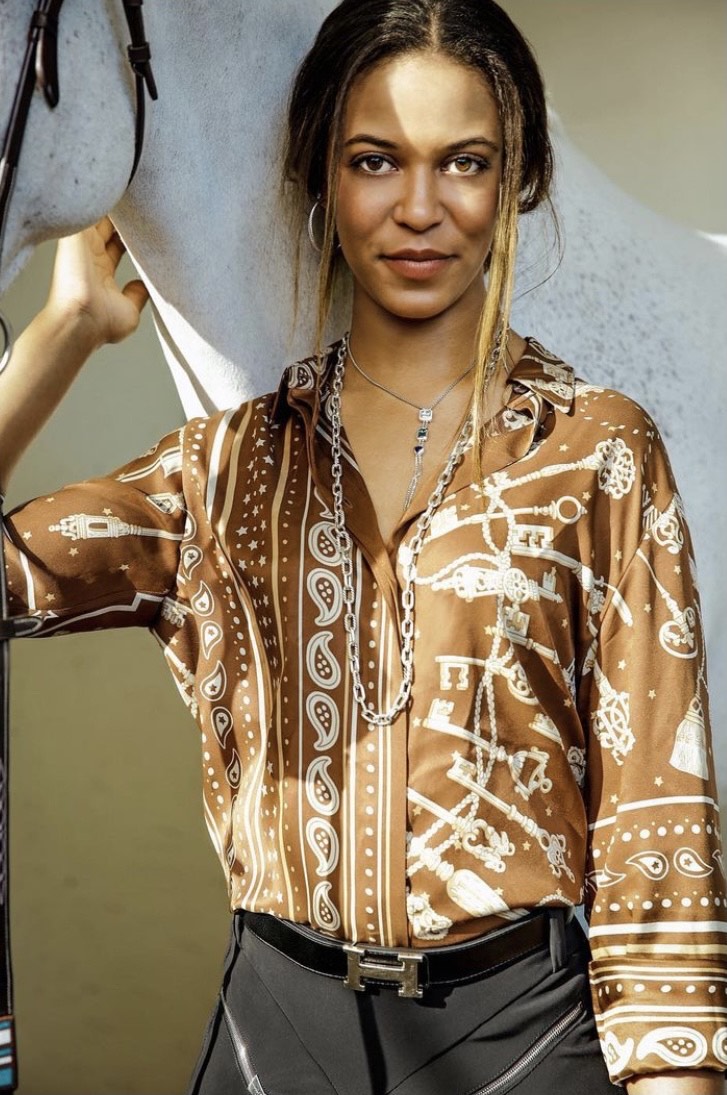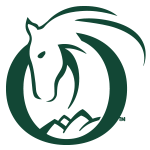Mavis Spencer is the next athlete to step under our rider spotlight! From the show ring to the in-gate, Mavis has captured many international accomplishments. She joined us at TIEC for the first time during the Tryon Fall Series, but an unfortunate injury during her first week put her time in the saddle on hold. With a smile on her face, Mavis made the most out of her time on the sidelines by supporting her teammates, cheering on fellow competitors, and enjoying the sport from a spectator’s perspective. Continue reading to hear about her quarantine experience, top career highlights, background in the sport, and more!

Welcome to TIEC! What made you decide to join us?
I work for Georgy Maskrey-Segesman, and she had been out here last summer for the first time and absolutely loved it. With Indoors being moved here, we came with a couple of the equitation horses and it worked out that I was able to bring two for myself. It’s definitely hard in California right now as there are no shows in LA County due to COVID, plus there are the fires up north, so shows have been getting cancelled. It’s terrible! It worked out that we were able to come here. Georgy loves it so much. She’s even looking at buying a property in the area so we can spend more time here and on the east coast.
How have you enjoyed TIEC?
I love it here. Obviously, it’s been a bit of a limited experience due to my accident. The horses shipped really well out here, and felt really good the first couple of days we were riding them. We got here the Friday before, so they could have a couple days to adjust after the trip. We loved going out on the cross-country course, the footing is amazing, and the stalls are great. I think the horses are super happy here. It’s nice being able to come back east again because I grew up here. I’ve seen so many videos of TIEC, watched the WEG, and all of that, but it’s nice coming and actually being able to see it. It’s lived up to all of my expectations!
We’re so sorry to hear about your accident. How have you been spending your time?
Life with horses obviously has its ups and downs. The accident happened right in front of FEI and all of the stewards were great, the EMTs came right away, and they told me about the new ShowPlus plan, which I had never heard of. We don’t have it on the west coast. I think it’s incredible as far as covering the gap expense that my insurance will cover, from the hospital bills to show fees and all of that. I think it’s something amazing that they’re offering us here. All things considered, everyone has been so nice and really helpful. I called Darragh Kenny, who’s one of my good friends, and he’s showing one of the horses for me. I try to always find the positive in things. There are definitely worse places to be stuck with a broken leg. It’s kind of nice to sit back, watch and make the most of the situation that I’m in!
The doctors basically told me that I needed to do very little. Some family friends of ours have a cabin not too far away, so I spend a lot of time on the porch in my ice bucket looking out at the view. I came to the show on Tuesday to watch Darragh ride the horse for the first time, and then I came out today to watch again. I’m trying to come out a bit more now. The first few days were just hard with my leg, but again, it’s been great. I was able to rent a golf cart really easily, the facilities are super easy to get around, and they’re very handicap accessible. It’s something you don’t really think about until you need to. Riders always notice so many things about the facility as far as it relates to us and our horses, so I think now being on the other side as a spectator, there’s just so many aspects I appreciate beyond good footing, nice arenas, good jumps and courses, and so on.
How did you get started in the sport?
Neither of my parents ride, but my aunt does. She has a breeding operation in Massachusetts. She was the one who got me into horses in the first place. My parents said ‘horse’ was my first word, which I know is kind of a cliché, but I always had a passion for it. It’s been a different journey for my parents. When your kid is in kindergarten and the teacher asks what you want to be when you grow up, kids normally say ‘superhero’ or something, and I always said that I was going to ride horses. When I talk to my parents and their friends about it, they’re always mildly surprised, but also impressed and happy for me that I was able to make my passion my lifestyle!

What’s been a highlight for you?
Honestly, I’ve had a couple of great wins in the ring that meant a lot. I’ve worked for a couple of riders, and when I was in Rome grooming for Lorenzo de Luca, he jumped clear in the Grand Prix. The atmosphere, experience and excitement was one of my favorite moments of my career, even though it wasn’t one that I won myself. When I worked for Darragh [Kenny], he jumped clear in our first Saturday night Grand Prix of the year on a horse that was given to us. Watching all of the work that we put in are the moments I really remember.
I won a Grand Prix in Sacramento a couple years ago while working for Neil Jones, and Eric Navet was second. I remember him congratulating me and me thinking, ‘This is never going to happen again. I just need to retire now!’ That was a personal riding highlight, but there are so many parts of the sport that I find so rewarding. Even if it’s a young horse jumping their first 1.40m class. It’s hard to pinpoint one thing since there are so many steps to get there. Spectators see the 90 seconds in the ring, and I don’t think they realize how much work goes into getting there. Again, the horse that Lorenzo and I had in Rome was one that had never done it before and was just stepping up to that level. Everyone on the team had been working so hard to get her there, so it was a big moment. We were all just screaming and hugging when he came out of the ring. That’s something that I’ll always remember. It’s so important to appreciate those moments as well because, again, it’s just 90 seconds in the ring. There’s so much blood, sweat and tears that goes into getting there.
What advice would you give to up-and-coming athletes?
The biggest thing is not being afraid of hard work. A lot of people message me saying, ‘I’m looking for a riding job,’ or, ‘I want to compete.’ It always pertains to riding, but you can’t just wait for the perfect opportunity to come up. It’s very rare in this sport that you walk into an ideal job. People notice hard work and loyalty, and you have to be willing to start grooming for someone, then maybe get a young one to show, or however it progresses. Sitting around and waiting for things to be handed to you was never really my mentality. Especially in this sport, you have to be willing to do whatever it takes if you really want to get there. There’s a lot of different paths you can take, but sitting around with your hand out waiting for someone to give you a string of nice horses is just not realistic. Again, being loyal and patient is important. Sometimes, when things don’t work out, people get anxious and feel like they need to switch to something else because it hasn’t happened yet. Sticking around and not just paying your dues but waiting will make people want to help you because you’ve helped them. At the same time, it’s important to surround yourself with good people. It’s all a balance. You can’t be afraid to muck out stalls or tack up your own horses. You have to be willing to do whatever it takes to get there!

How was your quarantine experience?
I had just started working for Georgy at the end of Thermal. It was week 6 when I started with her, and then week 8 ended up being cancelled. We went home early and I went back to San Diego to pack all of my stuff up. Quarantine basically happened the day before I was supposed to move up to their farm. I pretty much moved in the day everything shut down. I hadn’t ridden in like two years either, and we had 50 horses in training with no clients coming out to ride because of quarantine. We were all riding like 12 to 14 horses a day! I was crawling back into the house at the end of the day and passing out. For me, life went on at the barn in a certain respect. We were all just basically riding and going home. I would never complain as I was able to stay busy. It helped keep the boredom at bay, which is where I assume a lot of people were struggling. The break from the shows was so nice for me because I had just started my new job and was able to spend a lot of time at home. Georgy has a beautiful farm in California, so I was able to get to know all of the horses. We did a lot of strengthening training for them, and for me as well. When we were able to start showing again, I walked in on the new horse I had just gotten and won a Grand Prix. If you told me that at the start of the week, I would’ve thought you were crazy. There was honestly so much positive to it [quarantine] as you never really get a break in this sport. Unless you sit down and set a month to take off, you keep going. Having the forced break was good for us. It’s easy to sit there, moan and complain, but I think finding the positive and making the most of it is important, especially when you consider how lucky we are to keep doing this in the midst of a global pandemic.
In your opinion, how can we grow equestrian sport?
This is a conversation that our whole team has been having, and something that Georgy really wants to help out with as much as possible. You have to find a way to create a mid-level in the sport that isn’t as expensive, where riders who are coming up in the sport can show in. That way, you can produce young horses without it being super expensive. You need to get experience in general that’s more affordable. Georgy created the West Coast Equestrian League, which is part of what we did during a few horse shows this season. Going forward, her idea is to rent a couple of facilities and not have the shows be USEF-rated or anything like that, but more training shows where you can pay a hundred dollars and jump around a nice set of fences, do it a few times if you need to, and really build up the bottom of the sport. I feel like the bottom of the sport is dropping out a little bit. You don’t see a lot of people who are able to come up through the ranks with normal amounts of money because the shows are so expensive. That’s something that we’ve really been working on. It’s not to say that it’s not simply an expensive sport, because it is, but it gives people the option to do training shows where you can produce young horses, make videos of sales horses, and keep your older horses going in between shows. We don’t really have very much of that over on the west coast, so we’ve been working really hard to help that. Going forward, we really want to create opportunities for people who wouldn’t necessarily be able to afford to go to other shows.
Thank you for chatting with us, Mavis! We can’t wait to welcome you back to TIEC.





















 Copyright © 2022 · All rights reserved · ShowGrounds, LLC. · Shelburne Falls MA · 1-888-429-9495
Copyright © 2022 · All rights reserved · ShowGrounds, LLC. · Shelburne Falls MA · 1-888-429-9495